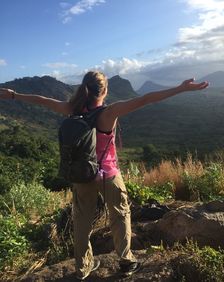 People do not always think about the impact a new culture can have on them. In 30 days, your life can change forever. Kelsey Johnson, a Pre-Professional Animal Science major, is an example of what 30 days in a different country can do for your life. In the summer of 2016, Johnson decided to join the Community Development Program in Mozambique.
People do not always think about the impact a new culture can have on them. In 30 days, your life can change forever. Kelsey Johnson, a Pre-Professional Animal Science major, is an example of what 30 days in a different country can do for your life. In the summer of 2016, Johnson decided to join the Community Development Program in Mozambique.
Johnson became inspired by the Mozambique program after attending a study abroad fair in the Union. She then had a meeting with one of the leads for the program, Dr. Lanier Nalley. Johnson stated, “By the time I walked out, I was convinced and set on going to Mozambique!”
Her project was to perform an experiment in Nampula, Mozambique on a poultry farm called New Horizons.
“I invested an immense amount of time and effort to ensure that my project was successful and benefitted the New Horizons business as well as the lives of the Mozambican people,” said Johnson.
Chick mortality rate is the issue she was facing in her experiment and is one that has plagued the poultry industry in Mozambique.
“My experiment involved aiding in the problem of chick dehydration during transport,” said Johnson. “My plan was to help cut down the mortality rate of the chicks in the first seven days. I created a concentrated gelatin product that I used to help hydrate the chicks on their way to the out grower farms.”
She prepared for this experiment before she ever arrived in Mozambique. Her hard work and dedication led to a successful project.
“Before I arrived in Mozambique, I ran a trial run of my experiment to discover what the best concentration of gelatin would be to use on the farm,” said Johnson.
While in country she ran into a few problems with the gelatin she created, but with a little perseverance and patience, she was able to overcome the obstacles. Some of the obstacles she faced was the concentration she created melted too quickly in the heat, and the way she was going to administer the gelatin proved to be too difficult.
“I had to recreate a more concentrated gelatin product and reconstruct the way I fed the gelatin to the chicks. Having to overcome these obstacles taught me problem skills that I could never have learned in a classroom.”
She used this experience to reflect on an aspect of her life that allowed her to grow and change in a positive way.
“As a student I have always worked hard to ensure I made excellent grades, but many times I think I was just yearning for an A rather than actually paying attention to what I was learning,” said Johnson. “After seeing the kind people of Mozambique, who would love to get the chance to go to college, I now have a greater appreciation for my education and way of life. Now I plan on working even harder to understand and apply what I learn in the classroom to my life. I also have a much more positive outlook and will complain less because the people of Mozambique are always smiling and so should I!”
This experience shined a light on a new future for Johnson and gave her affirmation that she is on the right path.
“My international experience solidified my thoughts about continuing to veterinary school after my first four years of college,” said Johnson. “I want to work hard and learn as much as I can so that I can go back to Africa one day and help the people there with the advanced skills I will learn. I’ve also decided that I might minor in poultry science so that I can go back to New Horizons and continue to help them in the future.”
The work she completed in Mozambique inspired Johnson to change; she advocates for this change when speaking to other students about committing to an international experience.
“There is no better way to gain academic skills than abroad because they can be actively applied in a real-life setting,” said Johnson. “It is truly a unique experience that allows students to grow personally as well because the environment is so drastically different compared to the United States.”


